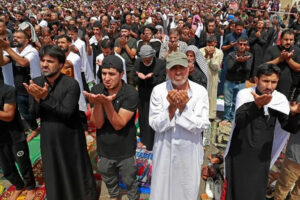
Supporters of Iraqi Shiite cleric Moqtada Sadr gather for the weekly Muslim Friday prayers during their vigil outside parliament headquarters in Baghdad’s Green Zone on Friday. (AFP)
Moon Desk: Iraq’s caretaker Prime Minister Mustafa Al-Kadhimi warned Saturday that the political crisis in the country is threatening security achievements made in past years.
Al-Kadhimi’s warning is a clear indication of the dangers of one of Iraq’s worst political crises since the 2003 US-led invasion of Iraq. It is the result of disagreements between followers of influential Shiite cleric Muqtada Al-Sadr and rival Iran-backed groups since last year’s parliamentary elections.
Al-Sadr won the largest share of seats in the October elections but failed to form a majority government, leading to what has become one of the worst political crises in Iraq in recent years.
His bloc later resigned from parliament and his supporters last month stormed the parliament building in Baghdad. Al-Sadr has demanded that parliament be dissolved and early elections held.
“This political crisis threatens the security achievements and the nation’s stability,” Al-Kadhimi said in a speech marking Islamic Day of Combatting Violence against Women in Baghdad.
“Now, the solution is for all political parties to make concessions for the interests of Iraq and Iraqis,” said Al-Kadhimi.
Last week, Al-Kadhimi called for a meeting of senior political leaders and party representatives to find a solution. He warned that if “fighting erupts, the shootings will not stop and will remain for years.”
Earlier this month, Al-Sadr called on his followers to be ready to hold massive protests all over Iraq but then indefinitely postponed them after Iran-backed groups called for similar rallies the same day, saying he wants to preserve peace and that “Iraqi blood is invaluable” to him.
Iraq has witnessed relative stability since the Daesh group was largely defeated in the country in 2017. But militants have continued to wage attacks, frequently hitting security forces and military targets with roadside bombs and firing on convoys or checkpoints.
During the rise of Daesh, when it controlled large parts of Iraq, deadly explosions were common in the oil-rich country.





